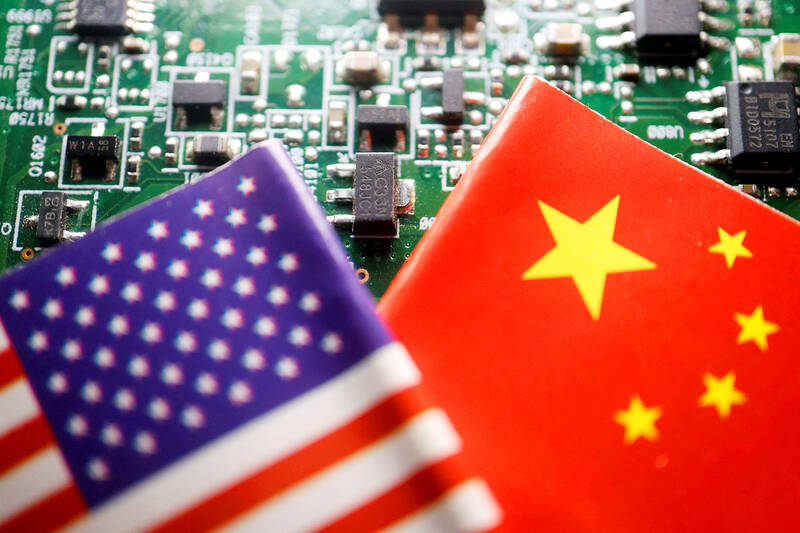Affected by US restrictions on China’s access to chipmaking machines, Taiwan’s exports to China and Hong Kong last month fell 26 percent from a year earlier to US$151 million, Ministry of Finance data showed.
While an improvement from March’s fall of nearly 34 percent, it still marked the 10th consecutive month of declines.
US-China tensions have risen over Taiwan, with the world’s leading producer of cutting-edge chips seeking greater ties with Washington in the face of rising pressure from Beijing.

Photo: Reuters
President Tsai Ing-wen (蔡英文) met with then-US House of Representatives speaker Nancy Pelosi last year and current speaker Kevin McCarthy last month, adding to strains.
US President Joe Biden has repeatedly stressed the need to place “guardrails” around the increasingly combative relationship, but China says those efforts are not genuine.
Taiwan’s slumping exports are also attributable to the ongoing dropoff in global demand for technology. The nation’s exports plunged 13.3 percent overall last month, as worldwide purchases of electronics remained weak.
Shipments to China of integrated circuit chips — pivotal components of electronic appliances, computers and smartphones — fell 19 percent from a year earlier, declining for a sixth straight month.
Separately, Taiwan Semiconductor Manufacturing Co (TSMC, 台積電), the world’s largest contract chipmaker, yesterday said sales last month stopped a two-month falling streak, with analysts citing a relatively low comparison base in March for the rebound.
In a statement, TSMC said it posted NT$147.9 billion (US$4.81 billion) in consolidated sales, up 1.7 percent from March.
Sales in March declined to a 17-month low of NT$145.41 billion, down 10.9 percent from a month earlier and 15.4 percent from a year earlier on continued inventory adjustments in the global semiconductor industry.
However, on an annual basis, sales last month declined 14.3 percent, TSMC said.
In the first four months of this year, TSMC’s consolidated sales stood at NT$656.53 billion, down 1.1 percent from a year earlier.
Additional reporting by CNA

TAKING STOCK: A Taiwanese cookware firm in Vietnam urged customers to assess inventory or place orders early so shipments can reach the US while tariffs are paused Taiwanese businesses in Vietnam are exploring alternatives after the White House imposed a 46 percent import duty on Vietnamese goods, following US President Donald Trump’s announcement of “reciprocal” tariffs on the US’ trading partners. Lo Shih-liang (羅世良), chairman of Brico Industry Co (裕茂工業), a Taiwanese company that manufactures cast iron cookware and stove components in Vietnam, said that more than 40 percent of his business was tied to the US market, describing the constant US policy shifts as an emotional roller coaster. “I work during the day and stay up all night watching the news. I’ve been following US news until 3am

Six years ago, LVMH’s billionaire CEO Bernard Arnault and US President Donald Trump cut the blue ribbon on a factory in rural Texas that would make designer handbags for Louis Vuitton, one of the world’s best-known luxury brands. However, since the high-profile opening, the factory has faced a host of problems limiting production, 11 former Louis Vuitton employees said. The site has consistently ranked among the worst-performing for Louis Vuitton globally, “significantly” underperforming other facilities, said three former Louis Vuitton workers and a senior industry source, who cited internal rankings shared with staff. The plant’s problems — which have not

TARIFF CONCERNS: The chipmaker cited global uncertainty from US tariffs and a weakening economic outlook, but said its Singapore expansion remains on track Vanguard International Semiconductor Corp (世界先進), a foundry service provider specializing in producing power management and display driver chips, yesterday withdrew its full-year revenue projection of moderate growth for this year, as escalating US tariff tensions raised uncertainty and concern about a potential economic recession. The Hsinchu-based chipmaker in February said revenues this year would grow mildly from last year based on improving supply chain inventory levels and market demand. At the time, it also anticipated gradual quarter revenue growth. However, the US’ sweeping tariff policy has upended the industry’s supply chains and weakened economic prospects for the world economy, it said. “Now

COLLABORATION: Given Taiwan’s key position in global supply chains, the US firm is discussing strategies with local partners and clients to deal with global uncertainties Advanced Micro Devices Inc (AMD) yesterday said it is meeting with local ecosystem partners, including Taiwan Semiconductor Manufacturing Co (TSMC, 台積電), to discuss strategies, including long-term manufacturing, to navigate uncertainties such as US tariffs, as Taiwan occupies an important position in global supply chains. AMD chief executive officer Lisa Su (蘇姿丰) told reporters that Taiwan is an important part of the chip designer’s ecosystem and she is discussing with partners and customers in Taiwan to forge strong collaborations on different areas during this critical period. AMD has just become the first artificial-intelligence (AI) server chip customer of TSMC to utilize its advanced